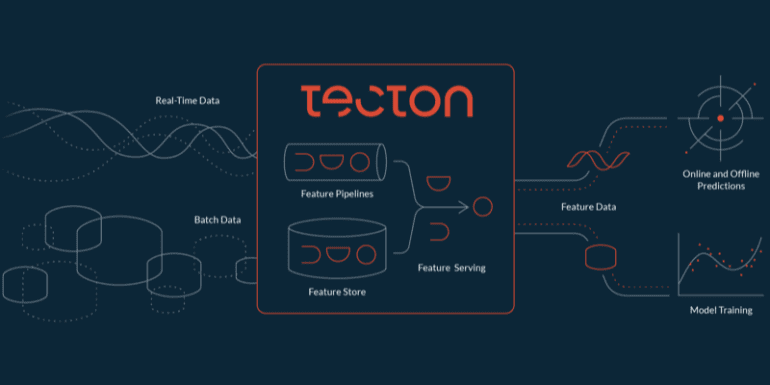TL;DR:
- Tecton conducted a groundbreaking survey on applied machine learning with 1700 respondents.
- Companies across industries are increasingly adopting applied ML for various use cases, including customer analytics and personalization.
- Challenges include accurate training data, production data pipelines, and demonstrating business ROI.
- Businesses are determined to improve applied ML capabilities, focusing on model deployment time and real-time ML.
- The survey reveals a strong emphasis on investing in MLOps stack components.
- Real-time ML adoption is on the rise, with teams deploying sub-100 milliseconds models.
- The report highlights the need for companies to fortify their MLOps stack to overcome challenges and leverage real-time ML.
Main AI News:
In a groundbreaking move, Tecton, the trailblazing machine learning (ML) feature platform company, has just unveiled the results of an expansive ML survey conducted among 1700 respondents. This comprehensive survey has proven to be a game-changer, identifying the challenges and opportunities within the applied ML space while spotlighting common trends across a diverse range of ML initiatives. For businesses seeking a competitive edge, this report sheds light on the current state of affairs in the world of applied ML.
The survey’s findings underscore a prevailing shift in the business landscape, with companies from various industries increasingly embracing applied ML to address a wide array of use cases. These include leveraging ML for customer analytics, personalized recommendations, and fraud detection. However, this forward momentum doesn’t come without its share of obstacles. Many organizations are grappling with difficulties during their journey to implement applied ML successfully. Issues such as generating precise training data, building robust production data pipelines, and proving business return on investment are among the challenges faced.
Despite these hurdles, the survey paints an optimistic picture of companies’ determination to enhance their applied ML capabilities. There is a growing emphasis on key areas such as reducing model deployment time, adopting real-time ML, and establishing central ML platforms that foster cross-team collaboration and enhance organizational scalability.
Mike Del Balso, co-founder and CEO of Tecton, shared his insights on the survey findings. He emphasized that the trends discovered in the survey resonate with Tecton’s experience working with customers and the broader ML community. The evidence suggests that more and more companies are transitioning to real-time ML and investing in their MLOps stack to overcome challenges, ultimately enabling faster deployment of models to production.
Key Survey Findings at a Glance:
Applied AI/ML: A Top Priority for Forward-Looking Organizations
- 23.8% of respondents identify applied ML as the number one company initiative, while 60.1% rank it among their top three priorities.
- Around 50% of survey participants confirm their organizations already have six or more models in production, with plans to deploy even more models swiftly. The projected median for the number of models in production is set to rise from 6 to 10 over the next 12 months.
- Companies leverage applied ML for use cases directly impacting revenue, with the top three being recommender systems (45.1% of respondents), customer analytics (43.3%), and personalization (36.4%).
Companies Fortify Their MLOps Stack to Surmount Challenges
- The top three challenges encountered when deploying new models to production are generating accurate training data (41.1%), building production data pipelines (37.6%), and demonstrating business ROI (34.3%).
- Deploying a new model to production is a time-consuming process, taking over one month for 65.0% of respondents and over three months for 31.7%. Nonetheless, 54.5% of respondents express their organizations’ commitment to reducing deployment time by at least 25% within the next 12 months.
- Currently, only 9.5% of respondents state that their organizations possess a full MLOps stack, comprising five crucial components: model serving; model registry and versioning; feature store / feature platform; model monitoring and observability; and data monitoring. Nevertheless, 59.1% of respondents affirm that their companies are actively planning to adopt all five components within the next 12 months.
- Within the next 12 months, the Feature Store / Feature Platform and Monitoring & Observability components are expected to witness the most significant increase in adoption (approximately 43 percentage points increase for both).
Real-Time ML Gains Momentum
- 68.3% of ML respondents indicate that their teams already have at least one real-time (e.g., sub-100 milliseconds) ML model in production, and a remarkable 14.7% boast more than ten.
- While 34.1% of respondents currently rely exclusively on batch data to power their real-time ML models, this figure is expected to plummet to 11.5% within the next 12 months as companies shift to streaming or real-time data.
Conclusion:
Tecton’s survey findings indicate that applied machine learning has become a top priority for organizations, as they seek to leverage ML for various revenue-generating use cases. The challenges faced during implementation are being addressed through a strong commitment to improving applied ML capabilities, with a particular focus on real-time ML adoption. Companies are recognizing the importance of investing in their MLOps stack to enhance efficiency and streamline model deployment. As real-time ML gains traction, businesses that adapt swiftly to these trends will likely gain a competitive advantage in the market, delivering enhanced customer experiences and optimizing their operations.

